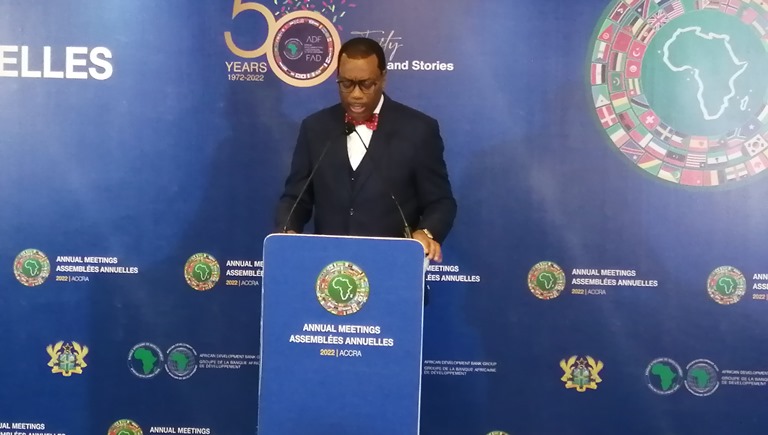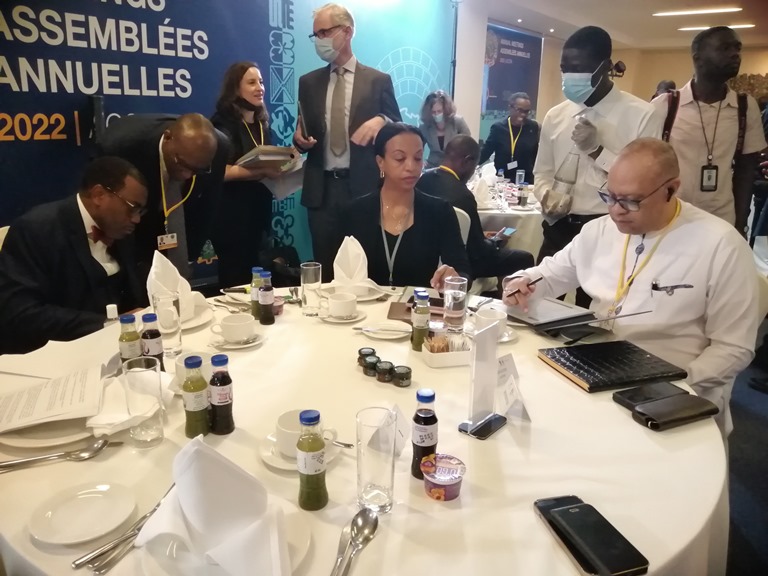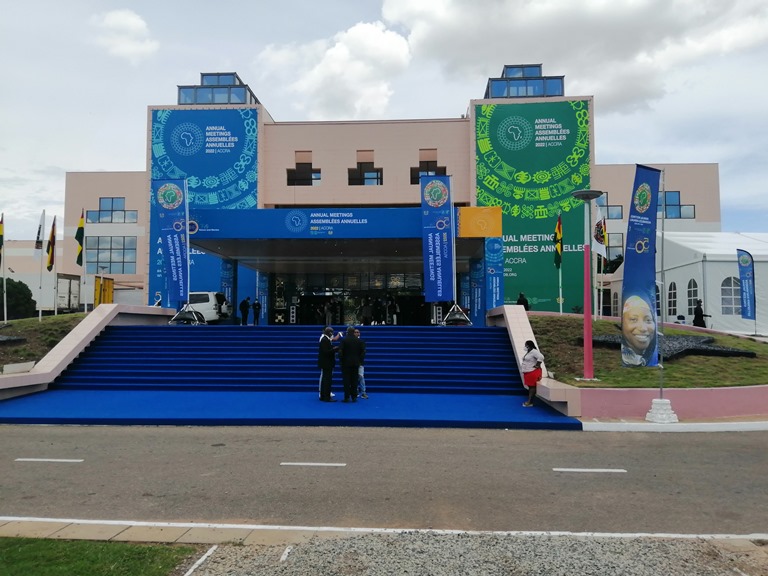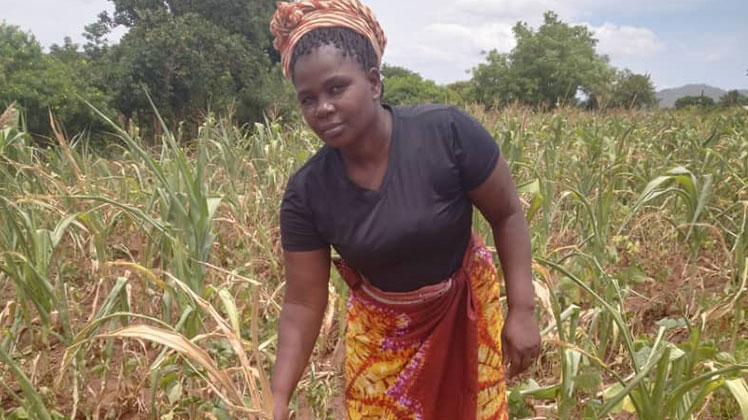Climate, Energy and Food high at AfDB indaba
Accra the Ghanaian capital is 2022 host to African Development Bank (AfDB) Group annual meetings an important continental event, attracting around 3,000 delegates and attendees. The platform allows the organization to take stock of progress with its shareholders, provide a unique forum for representatives of governments, business, civil society, think-tanks, academia, and the media, to discuss key issues concerning Africa’s ongoing development.
The 2022 annual meeting’s theme is, “Achieving Climate Resilience and a Just Energy Transition for Africa”.

Speaking during his inaugural opening 30 minutes speech on Tuesday at the Accra International Convention Centre, AfDB President Akinwumi Adesina began by welcoming participants to a gathering of the friends of Africa, the partners of Africa.
For this place, today, is filled with those who have faith in and hope in Africa. Yet, there are millions of Africans, those we serve every day, who are not here, yet we must see them. Yet we must hear their voices. Yet we must feel their needs in all we do.” Adesina open up his optimistic speech of hope in the presence of Nana Akuffo-Addo, Phillipe Nyesi and Madam Samia Suluhu Hassan Presidents of Ghana, Mozambique and Tanzania respectively.

So, the theme of our annual meeting: Achieving Climate Resilience and a Just Energy Transition for Africa”, is all about people, Adesina shared the gospel.
A lot of Africans he said are affected every day by climate change, majority of them women. Many of their lives are affected by lack of electricity, from a kid struggling to read with candles or lanterns, or the occasional streetlight in the neighborhood, to a mother who straps her baby on her back, using fuelwood and charcoal to cook, yet exposing herself and her child to effects of fumes that endanger their lives.

According to Adesina, Africa is the least emitter in the world, accounting for only 4% of all global greenhouse gas emissions.
Yet, he explained the continent suffers disproportionately from the negative impacts of climate change, including increased frequency and intensity of droughts, cyclones, floods, compounded by desertification. He cited the examples of the recent cyclones that have affected countries like Madagascar, Mozambique and Malawi and the floods in KwaZulu Natal province in South Africa that caused massive devastation to infrastructure facilities and claimed lots of lives.
Counting the cost of climate change
Africa suffers $7-15 billion per year in loss and damage as a result of climate change, which are projected to rise to $40 billion per year by 2030.
“Africa has no choice but to adapt to climate change. To support the continent in doing so, AfDB has doubled its financing for climate to $25 billion by 2025. Without any doubt, the AfDB is the leader on climate adaptation in Africa, and globally. The share of our climate finance dedicated to adaptation is 67%, the highest among all multilateral development Banks,” Adesina said amidst applause from the audience.
“Your Excellencies, the Bank and the Global Center on Adaptation are implementing the Africa Adaptation Acceleration Program, with the goal of mobilizing $25 billion in climate adaptation financing for Africa,” said the confidently speaking Adesina with gestures adding that, “The Bank is also supporting countries to insure themselves against extreme weather events, through its Africa Disaster Risk Insurance Facility. Today, the facility is helping nine countries to pay for insurance premiums to protect themselves from effects of climate change.”
Securing food security
On the state of food security, the AfDB President said his institution is leading on securing Africa’s food supplies in the face of climate change.
“Six years ago, I launched the Feed Africa strategy of the Bank. Our goal was to deliver climate resilient agricultural technologies at scale to farmers, and feed Africa. We are achieving incredible success. Our Feed Africa work has already benefitted over 76 million farmers with access to improved agricultural technologies. Our flagship program, Technologies for African Agricultural Transformation (TAAT) has delivered climate smart seeds to 12 million farmers in 27 countries in just two years. We are helping farmers to beat climate change,” Adesina touted the continental efforts toward building resilience to climate change.
Tackling looming food crisis
To tackle the looming food crisis in Africa from the effects of the Russian war in Ukraine, AfDB and the African Union Commission have developed an Africa Emergency Food Production Plan. The $1.5 billion plan will be used to support African countries to produce food rapidly to ensure sustained supply.
Said Adesina, “The plan will produce 38 million metric tons of food, including wheat, maize, rice, and soybeans. The total value of the additional food production is $12 billion. Our $1.5 billion investment will deliver $12 billion, a leverage factor of eight times. The plan will deliver climate-resilient agricultural technologies to 20 million farmers.”
I am delighted that the Board of Directors of the African Development Bank approved the $1.5 billion African Emergency Food Production Facility last Friday, May 20th, 2022, he made the announcement.
This follows a global convening by the Bank, in partnership with the African Union Commission, African Ministers of Finance, Ministers of Economy, Ministers of Agriculture, the African development finance institutions, UN agencies, developed countries around the world, and the Managing Director of the International Monetary Fund.
“We agreed it is time to support Africa to produce its food. It is time to have food sovereignty. Food aid cannot feed Africa. Africa does not need bowls in hand; Africa needs seeds in the ground and mechanical harvesters to harvest bountiful food produced locally. Africa must feed itself with pride. There is no dignity in begging for food.” Said Adesina
Energy transition
As part of the switch to clean energy, AfDB is also spearheading Just Energy Transition for Africa. Since 2009 the Bank has not funded any new coal projects. Not funding coal has now been formalized as a policy with our new Energy Policy approved by our Board of Directors, said the AfDB President.
“Africa has perhaps the world’s largest potentials for renewable energy sources, especially solar, hydro, geothermal and wind. AfDB is implementing the $20 billion Desert to Power initiative in the Sahel, to build 10,000 megawatts of solar power generation. This will provide electricity via solar for 250 million people and turn the Sahel into the largest solar zone in the world,” Adesina explained.
The African Just Energy Transition Facility, will be used to support African countries to transition from heavy fuel oil and coal power plants to renewable energy baseload power systems.
“As we look at energy transition, we must ensure three imperatives. First, we must ensure access and affordability of electricity. Second, there must be security of supply. Third, gas must remain a critical part of the energy mix for Africa. Even if Sub-Saharan Africa triples its use of gas for energy, it will only contribute less than 0.67% to global carbon emissions,” the confidently speaking Adesina said.
Progress will depend on developed economies fulfilling their commitment to provide at least $100 billion climate finance annually to developing countries.
We must ensure that promises made at COP 26 in Glasgow must now be delivered at the COP 27 in Sharm El Cheikh, Egypt, at the Africa COP.
In his remarks Ghanaian President Nana Akuffo-Addo said the confluence of rising challenges and expectations require that, together, we act with sustained conviction.
In addition to the pressing food, fuel and fiscal challenges, Addo said we still have to ensure that: the remaining eighty-five percent (85%) of the continent’s population are vaccinated against COVID-19; the remaining sixty percent (60%) of health facilities on the continent are connected to reliable source of electricity; the teeming youth, who are over sixty percent (60%) of our population, are better educated and equipped for the job market, i.e. to become a digitally enabled entrepreneurial generation; the Africa Continental Free Trade Area (AfCFTA) transforms Africa with her combined GDP of $3.3 trillion are permanently addressed.
“The stakes could not be higher and clearer. To move towards resolving these, we must support the Bank to do what a Bank does – to mobilise and invest funds. We must activate a process that moves this Bank from the corridors of ‘Billions to Trillions’, given the scale of the challenges on this continent.
Ultimately, the AfDB must become the dominant financing institution for African transformation in the medium term. This means we must bridge and overhaul the financing gap that exists with other complementary institutions,” Addo as host President said.
Our support will be critical to building the Africa We Want, as espoused by Agenda 2063, from today he wrapped up.





